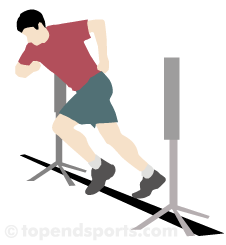When you assess running / sprinting ability, performance is usually measured as the speed or time over a set distance. This is usually the most appropriate measure of power output, however sometimes you want to know the running power.
A 100 kg person running 40 meters in 6 seconds is very different to a 70 kg person running the same distance in the same time. Momentum is greater for the heavier person, and in contact sports this would be advantageous, however in other sports this would mean that stopping and changing direction would be more difficult.
Calculating power output for human running is complex, and below we have just an example for a 60kg person. The table lists power output for human walking (0 to 4 mph) and running (5+ mph), for a 60 kg person. This is an estimation, and does not take into account variations in differences in running efficiency. Runners of different weight will have different power scores.
| Velocity (mph) |
Velocity (meters/min) |
Oxygen Consumption (mL/min) |
Power (kcal/min) |
Power (watts) |
|---|---|---|---|---|
| 0 | 0 | 210 | 1.01 | 70 |
| 2 | 54 | 530 | 2.57 | 179 |
| 3 | 81 | 700 | 3.35 | 233 |
| 4 | 107 | 850 | 4.11 | 286 |
| 5 | 134 | 1820 | 8.76 | 610 |
| 6 | 161 | 2140 | 10.3 | 719 |
| 7.5 | 201 | 2630 | 12.7 | 883 |
| 10 | 268 | 3430 | 16.5 | 1150 |
| 15 | 403 | 5050 | 24.3 | 1690 |
 Source: The table values are calculated from equations in: American College of Sports Medicine. Guidelines for Exercise Testing and Prescription, 4th edition. Philadelphia: Lea & Febiger, 1991, p. 285-300.
Source: The table values are calculated from equations in: American College of Sports Medicine. Guidelines for Exercise Testing and Prescription, 4th edition. Philadelphia: Lea & Febiger, 1991, p. 285-300.
Running Uphill
If you are running on trails with many uphill and downhill sections, then power output and energy expenditure will be different. See the page about calculating running power on a treadmill.
Related Pages
- About calculating running power on a treadmill.
- See also MET: Calculating calories burned during physical activity
- Calories Burned Running — determines how many calories you have burned based on your weight and distance run.
- Power is calculated from running speed in the RAST Test
- Power calculations for Vertical Jump Testing
- Energy Expenditure using a Pedometer — by counting steps you can estimate how much energy you are using.
- About Energy Expenditure — methods, formula and calculators.
- Running sprint fitness tests


 Current Events
Current Events